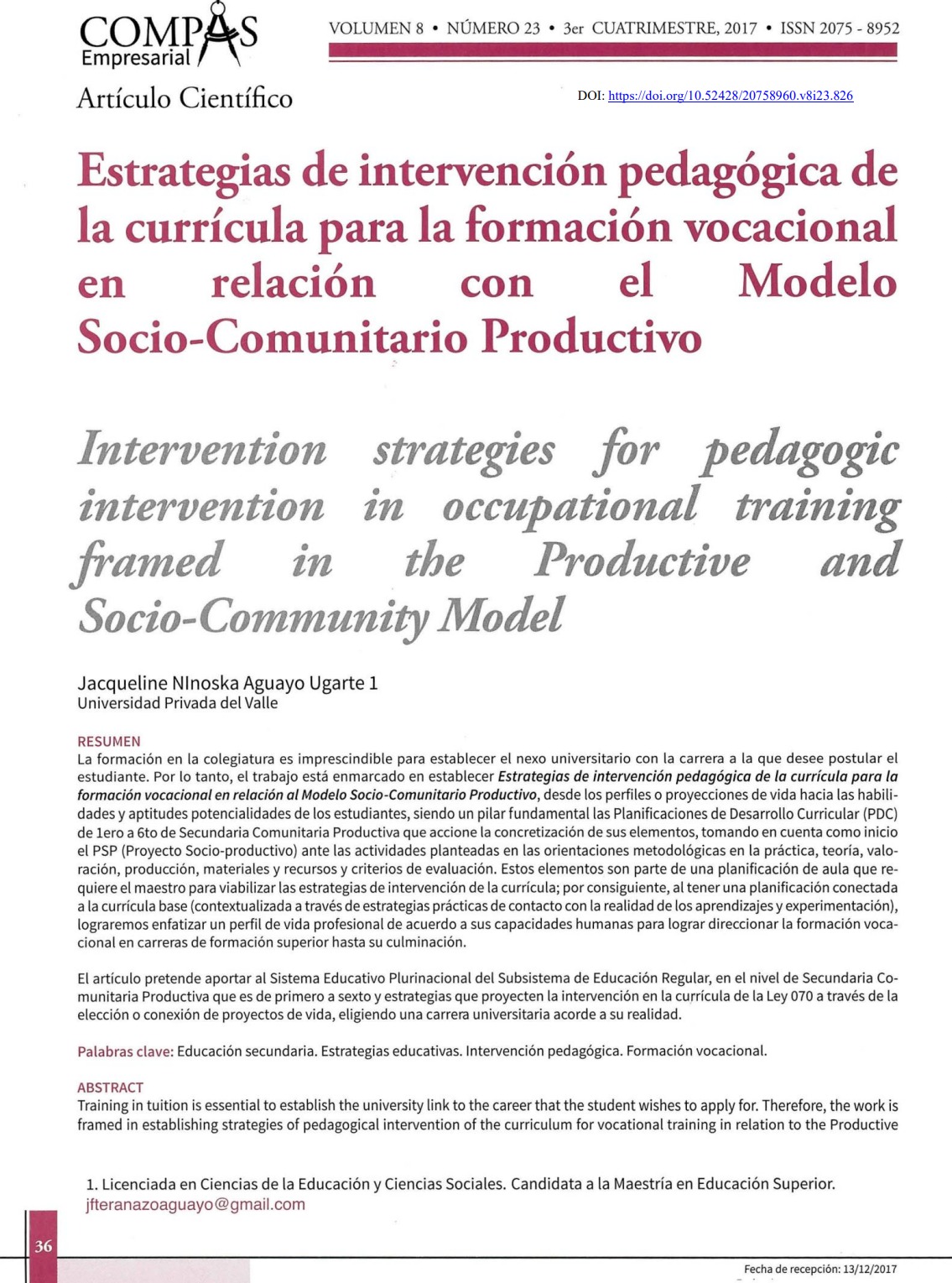Estrategias de Intervención Pedagógica de la Currícula para la Formación Vocacional en Relación con el Modelo Socio-Comunitario Productivo
DOI:
https://doi.org/10.52428/20758960.v8i23.826Palabras clave:
Educación secundaria, Estrategias educativas, Intervención pedagógica, Formación vocacionalResumen
La formación en la colegiatura es imprescindible para establecer el nexo universitario con la carrera a la que desee postular el estudiante. Por lo tanto, el trabajo está enmarcado en establecer Estrategias de intervención pedagógica de la currículo para la formación vocacional en relación al Modelo Socio-Comunitario Productivo, desde los perfiles o proyecciones de vida hacia las habilidades y aptitudes potencialidades de los estudiantes, siendo un pilar fundamental las Planificaciones de Desarrollo Curricular (PDC) de lera a 6to de Secundaria Comunitaria Productiva que accione la concretización de sus elementos, tomando en cuenta como inicio el PSP (Proyecto Socioproductivo) ante las actividades planteadas en las orientaciones metodológicas en la práctica, teoría, valoración, producción, materiales y recursos y criterios de evaluación. Estos elementos son parte de una planificación de aula que requiere el maestro para viabilizar las estrategias de intervención de la currícula; por consiguiente, al tener una planificación conectada a la currícula base (contextualizada a través de estrategias prácticas de contacto con la realidad de los aprendizajes y experimentación), lograremos enfatizar un perfil de vida profesional de acuerdo a sus capacidades humanas para lograr direccionar la formación vocacional en carreras de formación superior hasta su culminación. El artículo pretende aportar al Sistema Educativo Plurinacional del Subsistema de Educación Regular, en el nivel de Secundaria Comunitaria Productiva que es de primero a sexto y estrategias que proyecten la intervención en la curricula de la Ley 070 a través de la elección o conexión de proyectos de vida, eligiendo una carrera universitaria acorde a su realidad.
Descargas
Referencias
Ministerio de Educación (2011). Ley 070. Campos de saberes y conocimientos. La Paz, Bolivia: Ministerio de Educación del Estado Plurinacional de Bolivia.
Ministerio de Educación (2012). Ley 070. Diseño curricular base de la formación profesional, técnica y tecnológica. La Paz, Bolivia: Ministerio de Educación del Estado Plurinacional de Bolivia.
Ramírez, l. (2010). Apuntes de metodología de la investigación. Un enfoque crítico. Sucre, Bolivia: Fundación para la Investigación Estratégica en Bolivia (PIEB).
Peña JL, Escalera, A. (2012). Orientación Vocacional. Consultado el 15 de mayo de 2017, Ecured. Recuperado de www.ecured.cu/Sitio_Web_Formación_Vocaciona l_y_Orienta ció n_Profesiona1
Torres, M. y Paz, K., Salazar F. (2015) "Métodos de recolección de datos para una investigación". México: Ed. Universidad Autónoma del Estado de Morelos.
Ministerio de Educación (2016) Ley 070/2010. Currículo Final. Consultado el 31 de agosto 2016. Ministerio de Educación del Estado Plurinacional de Bolivia. Recuperado de http://www.minedu.gob.bo/files/ministerio-educacion/RM_49l_MOF_2016.pdf
NOEMAGICO (2012). Investigación Documental. Consultado el 27 de marzo de 2017. Recuperado de https://investigarl.files.wordpress.com/2010/05/la-inv-documental-noemagico-3.pdf

Descargas
Publicado
Número
Sección
Licencia
Derechos de autor 2017 Jacqueline Ninoska Aguayo Ugarte

Esta obra está bajo una licencia internacional Creative Commons Atribución 4.0.
Los autores/as que publiquen en esta revista aceptan las siguientes condiciones:
- Los autores/as conservan los derechos de autor y ceden a la revista el derecho de la primera publicación, con el trabajo registrado con la licencia de atribución de Creative Commons 4.0, que permite a terceros utilizar lo publicado siempre que mencionen la autoría del trabajo y a la primera publicación en esta revista.
- Los autores/as pueden realizar otros acuerdos contractuales independientes y adicionales para la distribución no exclusiva de la versión del artículo publicado en esta revista (p. ej., incluirlo en un repositorio institucional o publicarlo en un libro) siempre que indiquen claramente que el trabajo se publicó por primera vez en esta revista.
- Se permite y recomienda a los autores/as a compartir su trabajo en línea (por ejemplo: en repositorios institucionales o páginas web personales) antes y durante el proceso de envío del manuscrito, ya que puede conducir a intercambios productivos, a una mayor y más rápida citación del trabajo publicado.









